Choosing foods that keep one feeling full for longer periods can be a pivotal strategy for maintaining a balanced diet and achieving weight management goals. Foods that promote satiety can help curb unnecessary snacking and overeating by providing lasting energy and stabilizing blood sugar levels. This blog post explores a variety of foods known for their ability to sustain fullness, each offering unique nutritional benefits. Incorporating these foods into daily meals can lead to a healthier lifestyle and a more satisfying dietary experience.
Oatmeal
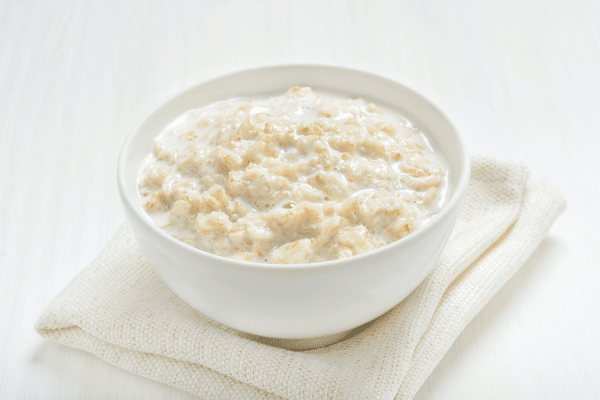
Oatmeal stands out as a breakfast staple that keeps hunger at bay, thanks to its high fiber content. The soluble fiber in oats, known as beta-glucan, forms a thick gel-like substance in the gut, slowing down the digestion process and extending the feeling of fullness. This slow digestion process also ensures a gradual release of sugar into the bloodstream, providing a steady source of energy and preventing sudden spikes in blood sugar levels. Additionally, oats are a versatile grain that can be enjoyed in various forms, from traditional stove-cooked porridge to overnight oats, making it easy to incorporate into any morning routine.
Not only does oatmeal contribute to satiety, but it also offers a blank canvas for a plethora of nutritious toppings and mix-ins. To enhance the health benefits and flavors, one can add fruits like berries or bananas for natural sweetness and a dose of antioxidants. Nuts and seeds can also be sprinkled on top for added crunch and a boost of healthy fats and proteins. For those avoiding gluten, selecting oats specifically labeled as gluten-free can ensure a safe and healthy start to the day, allowing everyone to reap the benefits of this filling and nutritious grain.
Eggs

Eggs are a powerhouse of nutrition and an excellent source of high-quality protein, making them a top choice for a filling meal. The protein in eggs provides a sustained source of energy and aids in muscle repair and growth. Moreover, the presence of all essential amino acids makes eggs a complete protein, beneficial for everyone, from athletes to individuals looking to maintain a healthy weight. The protein content in eggs not only supports bodily functions but also induces a sense of fullness, reducing the likelihood of reaching for snacks soon after a meal.
Beyond their nutritional value, eggs are incredibly versatile and can be prepared in numerous ways to suit any palate. Whether boiled, scrambled, poached, or made into an omelet, eggs can be a central part of meals beyond the traditional breakfast setting. They can be incorporated into salads for a protein boost, used in sandwiches for a satisfying lunch, or even included in stir-fries and quiches for a hearty dinner. Their adaptability makes it easy to keep meals interesting and varied while ensuring that every dish provides lasting satiety.
Greek Yogurt
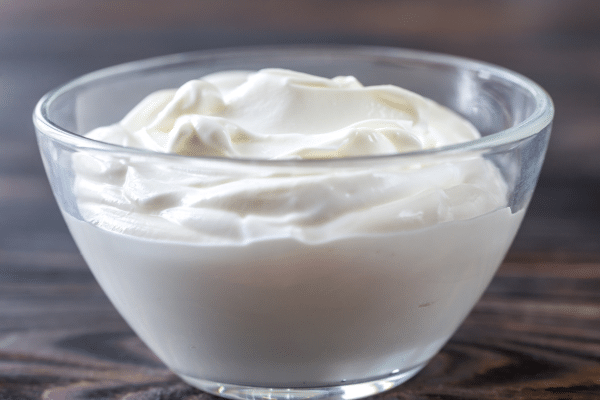
Greek yogurt is celebrated for its creamy texture and high protein content, setting it apart from traditional yogurt. The straining process it undergoes removes excess water and lactose, leaving behind a concentrated source of protein that helps in muscle repair and growth. This higher protein content plays a crucial role in keeping hunger at bay, making Greek yogurt an excellent choice for a satisfying snack or part of a meal. The probiotics found in Greek yogurt are beneficial for gut health, aiding in digestion and contributing to overall well-being.
Incorporating Greek yogurt into the diet offers endless culinary possibilities. It can be enjoyed on its own with a drizzle of honey or a sprinkle of nuts for added texture and flavor. Alternatively, it can be used as a base for smoothies, as a healthier substitute for sour cream or mayonnaise in dips and dressings, or even as a tenderizing marinade for meats. For those with lactose intolerance or dietary restrictions, lactose-free and plant-based alternatives are available, ensuring everyone can enjoy the benefits and versatility of this satiating food.
Almonds
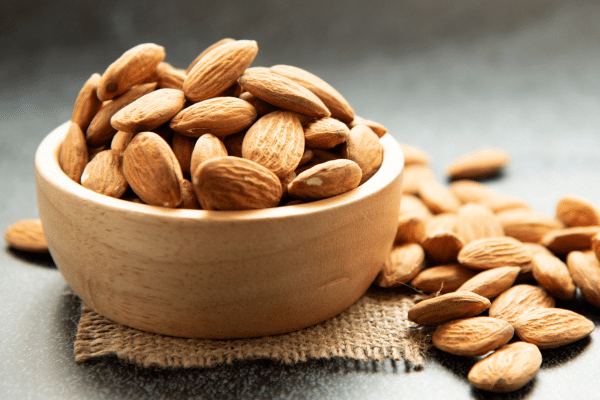
Almonds are a nutritional powerhouse, packed with healthy fats, protein, and fiber, making them an ideal snack for staving off hunger. The monounsaturated fats in almonds contribute to heart health and provide long-lasting energy. Additionally, the presence of protein and fiber in almonds slows digestion, which helps in maintaining a feeling of fullness and preventing overeating. Almonds also offer essential nutrients like vitamin E, magnesium, and antioxidants, supporting overall health.
Despite their high-calorie content, almonds can be part of a weight management plan when consumed in moderation. A small handful of almonds can serve as a satisfying snack, offering crunch and flavor. They can also be added to oatmeal, yogurt, or salads for an extra nutrient boost. Almond butter is another versatile way to enjoy the benefits of almonds, perfect for spreading on whole-grain toast or adding to smoothies. Portion control is key, ensuring that the nutritional benefits of almonds can be enjoyed without exceeding daily calorie needs.
Beans And Legumes
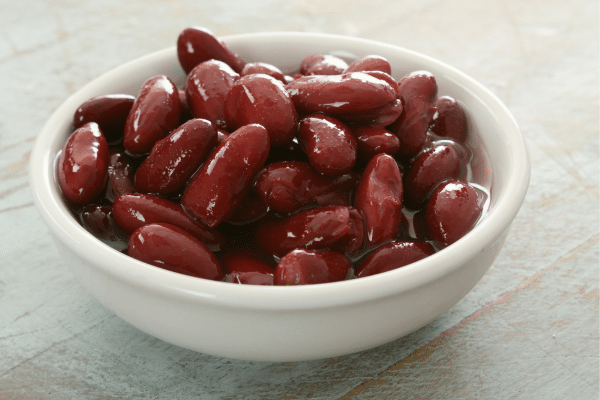
Beans and legumes are a staple in many cuisines around the world, valued for their high fiber and protein content. The combination of these nutrients contributes to a prolonged feeling of fullness, making beans and legumes an excellent choice for those looking to manage their weight and improve their overall health. The fiber in beans also aids in digestion and can help stabilize blood sugar levels, providing a steady source of energy throughout the day. Additionally, beans and legumes are a great source of plant-based protein, making them a crucial component of vegetarian and vegan diets.
Incorporating beans and legumes into meals is both economical and nutritionally beneficial. They can be used in a variety of dishes, from hearty soups and stews to refreshing salads and dips like hummus. Cooking beans from scratch allows for better control over the texture and flavor, but canned beans are a convenient and quick alternative, provided they are rinsed to reduce sodium content. To minimize digestive discomfort commonly associated with beans, it’s advisable to increase intake gradually and to ensure beans are cooked thoroughly.
Avocado
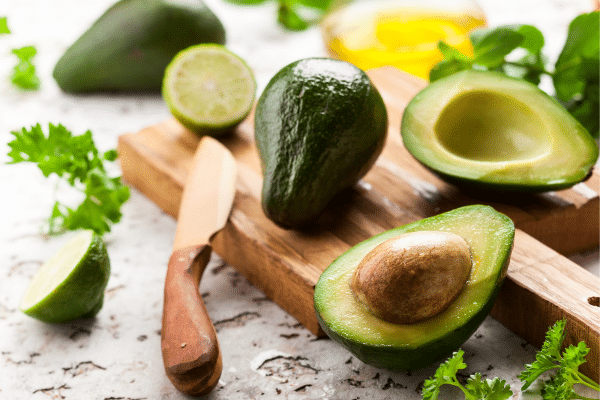
Avocado is renowned for its creamy texture and healthy fat content, particularly monounsaturated fats, which are known to promote heart health and provide lasting satiety. The fats in avocado slow down digestion, ensuring a steady release of energy and a prolonged feeling of fullness. Additionally, avocados are a good source of fiber and contain a variety of essential nutrients, including potassium, vitamin E, and B-vitamins, contributing to overall health and well-being.
The versatility of avocado makes it a popular addition to various dishes. It can be sliced and added to salads or sandwiches, mashed into guacamole, or used as a creamy base for smoothies. Avocado can even be used as a healthier fat substitute in baking, adding moisture and richness to cakes and muffins. Despite its numerous health benefits, it’s important to be mindful of portion sizes, as avocados are calorie-dense. Including avocado in a balanced diet can add both flavor and nutritional value to meals, ensuring a satisfying and healthful eating experience.
Quinoa
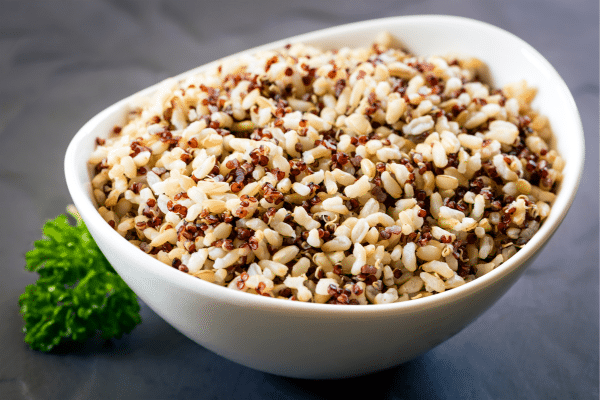
Quinoa is a nutritious seed that has gained popularity for its unique nutritional profile. It is one of the few plant foods considered a complete protein, containing all nine essential amino acids, which are crucial for muscle repair and growth. In addition to its protein content, quinoa is rich in fiber, which aids in digestion and promotes a feeling of fullness. It is also a good source of various vitamins and minerals, including magnesium, iron, and B-vitamins, supporting overall health and well-being.
Quinoa’s versatility makes it an excellent addition to any diet. It can be used as a base for salads, a substitute for rice in stir-fries, or even as a breakfast cereal alternative when cooked with milk and sweetened with fruits and honey. Its mild, nutty flavor and fluffy texture make it a suitable ingredient in a wide range of dishes. For those with gluten sensitivities, quinoa offers a nutritious and safe grain alternative, providing a wholesome and filling component to meals.
The Bottom Line
Selecting foods that keep one feeling full for extended periods is not only beneficial for weight management but also crucial for maintaining a balanced and nutritious diet. The foods highlighted offer a combination of fiber, protein, and healthy fats, each contributing to satiety and overall well-being. By incorporating these foods into meals and snacks, one can enjoy a diverse and satisfying diet that supports long-term health goals. It’s important to listen to the body’s cues and enjoy these foods in moderation, as part of a varied and balanced diet.


